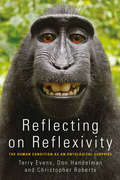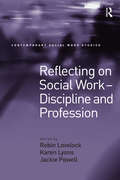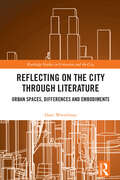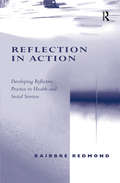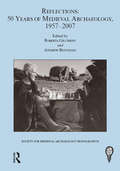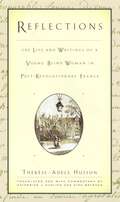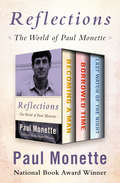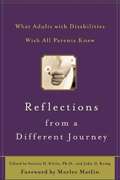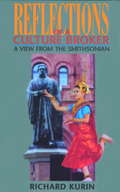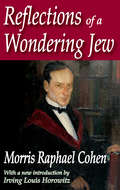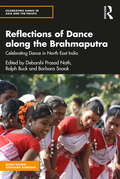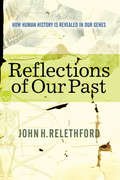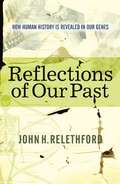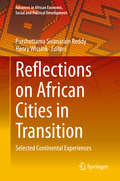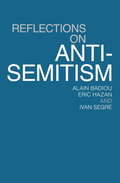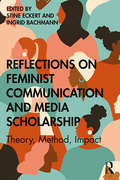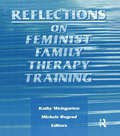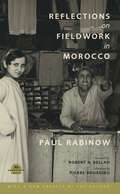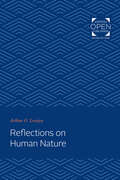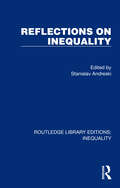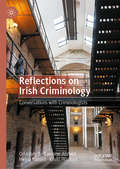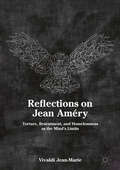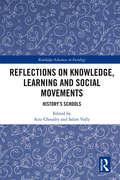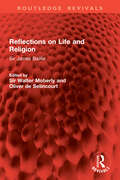- Table View
- List View
Reflecting on Reflexivity: The Human Condition as an Ontological Surprise
by Christopher Roberts Don Handelman T. M. S. Terry EvensHumanness supposes innate and profound reflexivity. This volume approaches the concept of reflexivity on two different yet related analytical planes. Whether implicitly or explicitly, both planes of thought bear critically on reflexivity in relation to the nature of selfhood and the very idea of the autonomous individual, ethics, and humanness, science as such and social science, ontological dualism and fundamental ambiguity. On the one plane, a collection of original and innovative ethnographically based essays is offered, each of which is devoted to ways in which reflexivity plays a fundamental role in human social life and the study of it; on the other-anthropo-philosophical and developed in the volume's Preface, Introduction, and Postscript-it is argued that reflexivity distinguishes-definitively, albeit relatively-the being and becoming of the human.
Reflecting on Social Work - Discipline and Profession (Contemporary Social Work Studies)
by Karen LyonsSocial work has always been a contested activity and its status as an academic discipline remains uncertain. There is currently renewed interest in the theoretical and research dimensions of social work, at a time when significant changes in the broad social, political and economic context in which practice takes place require a re-evaluation of social work's role and a re-examination of its identity. This timely book brings together leading social work academics to examine the state of social work at the beginning of the 21st century. With their focus on the relationships between research, theory and practice, they reflect critically on the nature of social work as a discipline in higher education and the importance of this to the profession as a whole. The book represents an exploratory conversation among social work academics about the current state and future aspirations of the discipline and the profession. It aims to stimulate wider debate about the dominant constraints and opportunities for social work in the 21st century.
Reflecting on the City Through Literature: Urban Spaces, Differences and Embodiments (Routledge Studies in Urbanism and the City)
by Daan WesselmanThis book develops and demonstrates an interdisciplinary method that reads literary works as a way of thinking about the city. Literary works do not only provide reflections of the city – depictions of the city as an aesthetically compelling setting – but the literary reflection of the city also offers a critical reflection on the city. How can spatial difference be conceived in cities that are changing beyond the form of the classical modern metropolis of the early 20th century? How can one think of the relation between individual urban subjects and their urban environment, when neither spaces nor discourses of the city provide them with an answer to the question where they might "belong"? How does the human body interact with its urban surroundings, and how should technological mediations be thought of? This book approaches these questions through analysing literary texts, focusing on concepts like heterotopia, non-place and the posthuman. This book will be of interest to interdisciplinary scholars and students of the city, particularly in the fields of Urban Studies, Literary Studies, Geography, and Architecture.
Reflection in Action: Developing Reflective Practice in Health and Social Services
by Bairbre RedmondNewly available in paperback, this original and informative volume outlines a new, well-designed reflective teaching and learning model that can be used with single- or multi-disciplinary groups of students and professionals. It offers an overview of the origins of the different theories of reflection and explains how different levels of reflection can be understood and incorporated into everyday teaching and training. Outlining specific teaching and learning techniques to be used in training situations, it also includes examples of how these techniques have been successfully used with groups of professionals from health and social care areas. This edition features a substantive new preface, bringing the book up to date with recent developments in the field. It is a well-researched guide to both the theory and the practice of reflection, and it also offers those who teach and train professionals a clearly delineated reflective model for use in the classroom or professional training environment.
Reflections: 50 Years of Medieval Archaeology, 1957-2007 (The Society for Medieval Archaeology Monographs)
by Roberta GilchristThis volume celebrates the 50th anniversary of the Society for Medieval Archaeology (established in 1957), presenting reflections on the history, development and future prospects of the discipline. The papers are drawn from a series of conferences and workshops that took place in 2007-08, in addition to a number of contributions that were commissioned especially for the volume. They range from personal commentaries on the history of the Society and the growth of the subject (see papers by David Wilson and Rosemary Cramp), to historiographical, regional and thematic overviews of major trends in the evolution and current practice of medieval archaeology. All the publications are fully refereed with the aim of publishing at the highest academic level reports on sites of national and international importance, and of encouraging the widest debate. The series’ objectives are to cover the broadest chronological and geographical range and to assemble a series of volumes which reflect the changing intellectual and technical scope of the discipline.
Reflections: The Life and Writings of a Young Blind Woman in Post-Revolutionary France (The History of Disability #5)
by Therese-Adèle HussonIn the 1820s, several years before Braille was invented, Therese-Adele Husson, a young blind woman from provincial France, wrote an audacious manifesto about her life, French society, and her hopes for the future. Through extensive research and scholarly detective work, authors Catherine Kudlick and Zina Weygand have rescued this intriguing woman and the remarkable story of her life and tragic death from obscurity, giving readers a rare look into a world recorded by an unlikely historical figure. Reflections is one of the earliest recorded manifestations of group solidarity among people with the same disability, advocating self-sufficiency and independence on the part of blind people, encouraging education for all blind children, and exploring gender roles for both men and women. Resolutely defying the sense of "otherness" which pervades discourse about the disabled, Husson instead convinces us that that blindness offers a fresh and important perspective on both history and ourselves.In rescuing this important historical account and recreating the life of an obscure but potent figure, Weygand and Kudlick have awakened a perspective that transcends time and which, ultimately, remaps our inherent ideas of physical sensibility.
Reflections: The World of Paul Monette
by Paul MonetteFrom an acclaimed memoirist and National Book Award winner: Three groundbreaking works of nonfiction put a human face on the AIDS epidemic. Paul Monette&’s searing memoirs of growing up, coming out, and losing his beloved partner to AIDS are now available in a single volume. Becoming a Man: This National Book Award–winning memoir follows Monette&’s childhood. Growing up all-American, Catholic, overachieving . . . and closeted, Monette wrestled with his sexuality for the first thirty years of his life, priding himself on his ability to &“pass&” for straight. This intimate portrait of a young man&’s struggle with his own desires and journey to adulthood and self-acceptance through grace and honesty is witty, humorous, and deeply felt. Borrowed Time: Chronicling Monette&’s relationship with Roger Horwitz, this tragic true story follows Horwitz&’s fight against and eventual death from AIDS. A &“tender and lyrical&” memoir (TheNew York Times Book Review), it remains one of the most raw and human tales of the AIDS era—a &“searing, shattering, ultimately hope-inspiring account of a great love story&” (San Francisco Examiner). The Last Watch of the Night: Compiling work from the last two years of his life, this collection of essays documents Monette&’s reflections as he slowly succumbed to AIDS. Ringing with humor, rage, and passion, his words provide a breathtaking view from inside the AIDS scourge. Brutal, funny, and startlingly honest, this comprehensive volume brings together some of the most important stories of the AIDS era.
Reflections From a Different Journey: What Adults with Disabilities Wish All Parents Knew
by John D. Kemp Stanley KleinFrom the book: In this book, people with all kinds of disabilities make clear that they can be capable role models for children; advisors to their parents and family members; and teachers to educators, health care professionals, and the many other adults who provide services for children with disabilities and their families. In fact, the essays have important messages for all of us as we strive to make our world a more caring, loving, and peaceful place for all children and families. This book is a wonderful celebration of diversity. The essay writers have grown up with many different kinds of disabilities in many different places, including some countries outside the United States. They are not people who have "overcome" their disabilities. Rather, they have overcome the prejudices of society that all too often stereotype people with disabilities in destructive ways.
Reflections from a Unicorn
by Rick CreechBorn with athetoid cerebral palsy in 1954, Rick Creech was not expected to live six months. Outliving the prediction of his early death, Mr. Creech was not expected to finish school or to attend college, was not expected to leave his or to make a contribution to society. However, in people's expectations, they forgot one variable, Rick Creech. Graduated Magna Cum Laude from East Carolina University in '85, Mr. Creech is an eloquent advocate of independent living and independence through augmented and alternate communicaton.
Reflections of a Culture Broker
by Richard KurinIs culture brokered like stocks, real estate, or marriage? In this engaging book, Richard Kurin shows that cultures are also mediated and indeed brokered by countries, organizations, communities, and individuals -- all with their own vision of the truth and varying abilities to impose it on others. Drawing on his diverse experiences in producing exhibitions and public programs, Kurin challenges culture brokers -- defined broadly to include museum professionals, film-makers, journalists, festival producers, and scholars of many disciplines -- to reveal more clearly the nature of their interpretations, to envision the ways in which their messages can "play" to different audiences, and to better understand the relationship between knowledge, art, politics, and entertainment. The book documents a variety of cases in which the Smithsonian has brokered culture for the American public: a planned exhibit on Jerusalem had to balance both Israeli and Palestinian agendas; debates over the 1996 Olympic Arts Festival presented differing visions of the American South; and the National Air and Space Museum's controversial display of the Enola Gay prompted the Smithsonian to re-examine the role of national museums. Arguing that cultural exhibits reflect a series of decisions about representing someone, someplace, and something, Reflections of a Culture Broker discusses the ethical and technical problems faced by not only those who practice in a museum setting but also anyone charged with representing culture in a public forum.
Reflections of a Wondering Jew
by Morris CohenMuch as he considered himself a philosopher, Morris Raphael Cohen was also immersed in the machinery of social life. From his first years of "engagement" as a volunteer teacher in Thomas Davidson's school for working-class people, to his last as professor of philosophy at New York's City College and at the University of Chicago, he constantly sought to understand the underlying assumptions of human behavior.The studies Cohen gathered together for Reflections of a Wondering Jew are an indication of representative achievements of his life. He was deeply involved in the experience of the American Jewish community, and much of his work here consists of an inquiry into and analysis of specifically Jewish affairs. Some of his most valuable contributions to American thought and maturity are those that were never included in standard philosophical efforts. His work and scholarship provide foundations for the field of human problems and the history of ideas. These lectures illuminated the way forward in so many of our crisis years.There is a certain tragedy to the fact that for many decades Morris Raphael Cohen had hoped to organize and put into systematic form his literary reflections on Jewish problems and American liberalism. Towards the end of his life, he faced the realization that many of his intended writings would never reach fruition. Though this volume may not be quite what Cohen intended, it is a product of a mature giant in American intellectual history.
Reflections of Dance along the Brahmaputra: Celebrating Dance in North East India (Celebrating Dance in Asia and the Pacific)
by Debarshi Prasad Nath, Ralph Buck, and Barbara SnookThis volume brings a critical lens to dance and culture within North East India. Through case studies, first-hand accounts, and interviews, it explores unique folk dances of Indigenous communities of North East India that reflect diverse journeys, lifestyles, and connections within their ethnic groups, marking almost every ritual and festival. Dance for people of North East India, as elsewhere, is also a way of declaring, establishing, celebrating, and asserting humans' relationship with nature. The book draws attention to the origins and special circumstances of dances from North East India. It discusses a range of important folk-dance forms alongside classical dance forms in North East India, with a focus on Sattriya dance. The chapters examine how these dance forms play an important role in the region’s socio-cultural, economic, and political life, intertwining religion and the arts through music, dance, and drama. Further, they also explore how folk dance cultures in North East India have never been relegated to the background, never considered secondary, aesthetically, or otherwise, but have become expressions of political and cultural identity. An evocative work, this volume will be of interest to students and researchers of pedagogy, choreography, community dance practice, theatre and performance studies, social and cultural studies, aesthetics, interdisciplinary arts, and more. It will be an invaluable resource for artists and practitioners working in dance schools and communities.
Reflections Of Our Past: How Human History Is Revealed In Our Genes
by John H RelethfordWhere did modern humans come from and how important are the biological differences among us? Are we descended from Neanderthals? How many races of people are there? Were Native Americans the first settlers of the New World? How can we tell if Thomas Jefferson had a child with Sally Hemings? Through an engaging examination of issues such as these, and using non-technical language, Reflections of Our Past shows how anthropologists use genetic information to test theories and define possible answers to fundamental questions in human history. By looking at genetic variation in the world today, we can reconstruct the recent and remote events and processes that created the variation we see, providing a fascinating reflection of our genetic past. Reflections of Our Pastis a W. W. Howells Book Prize Winner and Choice Outstanding Academic Title.
Reflections Of Our Past
by John H RelethfordWhere did modern humans come from and how important are the biological differences among us? Are we descended from Neanderthals? How many races of people are there? Were Native Americans the first settlers of the New World? How can we tell if Thomas Jefferson had a child with Sally Hemings? Through an engaging examination of issues such as these, and using non-technical language, Reflections of Our Past shows how anthropologists use genetic information to test theories and define possible answers to fundamental questions in human history. By looking at genetic variation in the world today, we can reconstruct the recent and remote events and processes that created the variation we see, providing a fascinating reflection of our genetic past. Reflections of Our Pastis a W. W. Howells Book Prize Winner and Choice Outstanding Academic Title.
Reflections on African Cities in Transition: Selected Continental Experiences (Advances in African Economic, Social and Political Development)
by Purshottama Sivanarain Reddy Henry WissinkThis volume describes African cities in transition, and the economic, socio-political, and environmental challenges resulting from rapid post-colonial urbanization. As the African continent continues to transition from urban configurations inherited from colonial influences and history, it faces issues such as urban slum expansion, increased demands for energy and clean water, lack of adequate public transportation, high levels of inequality among different socio-economic population strata, and inadequate urban governance, planning, and policies. African cities in transition need to reconsider current policies and developmental trajectories to facilitate and sustain economic growth and Africa’s strategic repositioning in the world.Written by an international team of scholars and practitioners, this volume uses case studies to focus on key issues and developmental challenges in selected African cities. Topics include but are not limited to, smart cities, changing notions of democracy, the city’s role in attaining the SDGs, local governance, alternative models for governance and management, corruption, urbanisation and future cities.
Reflections On Anti-Semitism
by Ivan Segre Eric Hazan Alain BadiouSince the inception of the 'War on Terror', Israel has become increasingly important to Western imperial strategy and ever more aggressive in its policies towards the Palestinians. A key ideological weapon in this development is the cynical and unjustified accusation of 'anti-Semitism' to silence protest and dissent. For historical reasons, this tactic has been deployed most forcefully in France, and in the first of the two essays in this book French writers Alain Badiou and Eric Hazan demolish the 'anti-Semitism is everywhere' claim used to bludgeon critics of the Israeli state and those who stand in solidarity with the banlieue youth. In 'The Philo-Semitic Reaction', Ivan Segré undertakes a meticulous deconstruction of a rampant reactionary trend that identifies Jewish interests with the 'democratic' West. Segré's aim is to uphold a universalist position and to defend Jewish tradition from Zionist ideological distortion.From the Trade Paperback edition.
Reflections on Feminist Communication and Media Scholarship: Theory, Method, Impact
by Stine EckertThis collection brings together ten of the most distinguished feminist scholars whose work has been celebrated for its excellence in helping to lay the foundation of feminist communication and media research. This edited volume features contributions by the first ten renowned communication and media scholars that have received the Teresa Award for the Advancement of Feminist Scholarship from the Feminist Scholarship Division (FSD) of the International Communication Association (ICA): Patrice M. Buzzanell, Meenakshi Gigi Durham, Radha Sarma Hegde, Dafna Lemish, Radhika Parameswaran, Lana F. Rakow, Karen Ross, H. Leslie Steeves, Linda Steiner, and Angharad N. Valdivia. These distinguished scholars reflect on the contributions they have made to different subfields of media and communication scholarship, and offer invaluable insight into their own paths as feminist scholars. They each reflect on matters of power, agency, privilege, ethics, intersectionality, resilience, and positionality, address their own shortcomings and struggles, and look ahead to potential future directions in the field. Last but not least, they come together to discuss the impact of the COVID-19 pandemic on women, marginalized people, and vulnerable populations, and to underline the crucial need for feminist communication and media scholarship to move beyond Eurocentrism toward an ethics of care and global feminist positionality. A comprehensive and inspiring resource for students and scholars of feminist media and communication studies.
Reflections on Feminist Family Therapy Training (Journal Of Feminist Family Therapy Ser.)
by Michele Bograd Kaethe WeingartenAlthough feminist family therapy has been gaining recognition and followers in recent years, little is known about the variety of experiences, philosophies, and private learnings of feminist practitioners. Reflections on Feminist Family Therapy Training utilizes first-person accounts, theory, and commentary to explore the challenges feminist teachers and practitioners face and the aspects of their practice that are seldom considered.Readers of Reflections on Feminist Family Therapy Training acquire effective teaching strategies and a sensitivity to the intersection of cultural diversity and feminism. Students are introduced to several contextual factors that shape personal and professional experiences, as well as techniques that address predictable patterns of behavior and attitudes toward feminist family therapy in a variety of settings. The book presents innovative ideas and strategies from experienced trainers for tolerating, working with, and resolving gaps between theory and practice and for confronting hostility or tension within specific institutional contexts.Aimed at building bridges between teachers and practitioners of family therapy from a feminist perspective, Reflections on Feminist Family Therapy Training explores and helps you answer the following questions: What similarities and differences exist between American and European feminist family therapists? What special challenges does the feminist therapist face in a conventional training institute? Does a feminist or liberal context attend adequately to the needs of the multicultural student body? How does a trainer&’s national standing or tenure status promote or harm her freedom to practice openly in a specifically feminist way? What new directions and opportunities exist for feminist family therapists?Reflections on Feminist Family Therapy Training looks at the difficulties women practitioners face in convincing family therapy to recognize the significance of gender as a variable factor. In doing so, it offers specific classroom applications and general approaches to the feminist task of getting unheard and repressed voices acknowledged. Finally, the book outlines future directions for expanding and improving feminist-informed training and for giving it a more central and integrated position in the curricula.
Reflections on Fieldwork in Morocco: Thirtieth Anniversary Edition, with a New Preface by the Author
by Robert N. Bellah Pierre Bourdieu Paul RabinowIn this landmark study, now celebrating thirty years in print, Paul Rabinow takes as his focus the fieldwork that anthropologists do. How valid is the process? To what extent do the cultural data become artifacts of the interaction between anthropologist and informants? Having first published a more standard ethnographic study about Morocco, Rabinow here describes a series of encounters with his informants in that study, from a French innkeeper clinging to the vestiges of a colonial past, to the rural descendants of a seventeenth-century saint. In a new preface Rabinow considers the thirty-year life of this remarkable book and his own distinguished career.
Reflections on Human Nature
by Arthur O. LovejoyOriginally published in 1961. Arthur O. Lovejoy, beginning with his book The Great Chain of Being, helped usher in the discipline of the History of Ideas in America. In Reflections on Human Nature, Lovejoy devotes particular attention to influential figures such as Hobbes, Locke, Bishop Butler, and Mandeville, tracing developments and changes in the concept of human nature through the seventeenth and eighteenth centuries. He also discusses the theory of human nature held by the founders of the American Constitution, giving special attention to James Madison and the "Federalist Papers."
Reflections on Inequality (Routledge Library Editions: Inequality #1)
by Stanislav AndreskiOriginally published in 1975, this anthology of essays focusses on the historical dimension of class inequality which has long concerned both sociologists and social philosophers but has often been neglected in literature. Although Marx is the first name to come to mind when social inequality and class struggles are mentioned, most of the authors included here precede him. Each analyses and discusses the problems of class conflict as they understood them in the light of their own times. Taken together these writers treat stratification as essentially a pecking order where position is determined by relative power – a notion which subsumes rather than contradicts the economic interpretation of social inequality because wealth is a form of power. The relation between the views of these authors and the well-known theory of Marx is discussed in the Introduction.
Reflections on Irish Criminology: Conversations with Criminologists
by Orla Lynch Yasmine Ahmed Helen Russell Kevin HosfordThis book explores the development of the discipline of Criminology on the island of Ireland, through conversations with leading criminologists. Adding depth and breadth to the understandings of this growing discipline, leading scholars discuss their personal journey to Criminology, their research areas, their theoretical influences and the impact of the discipline of Criminology on how we think about criminal justice in Ireland and beyond. Research topics include desistence, victims’ rights, parole, policing and research methods. The book explores what influences framed the work of key thinkers in the area and how Criminology intersects with policy and practice within and beyond the criminological and criminal justice fields. It provides an insight into how the discipline has emerged as a discrete subject through a discussion of Ireland's key historical moments. It argues that Ireland's unique historical, cultural, political, social and economic arrangements and research about Ireland have much to offer the international field of Criminology. This volume also reflects on future directions for Irish Criminology, as well as sounding warnings to ensure the healthy development of the field as a discipline in its own right and as an interdisciplinary undertaking.
Reflections on Jean Améry: Torture, Resentment, and Homelessness as the Mind’s Limits
by Vivaldi Jean-MarieThis book elaborates Jean Améry’s critique of philosophy and his discussion of some central philosophical themes in At the Mind’s Limits and his other writings. It shows how Améry elaborates the shortcomings and unfitness of philosophical theories to account for torture, the experience of homelessness, and other indignities, and their inability to assist with overcoming resentment. It thus teases out the philosophical import of Jean Améry's critique of philosophy, which constitutes his own philosophical testament of being an inmate at Auschwitz. This book situates At the Mind’s Limits in the context of twentieth-century Continental philosophy. On the one hand, it elaborates Améry’s engagement with key philosophical figures. On the other hand, it shows how thoroughly Améry denounces the limits of the philosophical enterprise, and its impotence in capturing and accounting for the crimes of the Third Reich.
Reflections on Knowledge, Learning and Social Movements: History's Schools (Routledge Advances in Sociology)
by Aziz Choudry Salim VallyHow do educators and activists in today’s struggles for change use historical materials from earlier periods of organizing for political education? How do they create and engage with independent and often informal archives and debates? How do they ultimately connect this historical knowledge with contemporary struggles? Reflections on Knowledge, Learning and Social Movements aims to advance the understanding of relationships between learning, knowledge production, history and social change. In four sections, this unique collection explores: • Engagement with activist/movement archives • Learning and teaching militant histories • Lessons from liberatory and anti-imperialist struggles • Learning from student, youth and education struggles Six chapters foreground insights from the breadth and diversity of South Africa’s rich progressive social movements; while others explore connections between ideas and practices of historical and contemporary struggles in other parts of the world including Argentina, Iran, Britain, Palestine, and the US. Besides its great relevance to scholars and students of Education, Sociology, and History, this innovative title will be of particular interest to adult educators, labour educators, archivists, community workers and others concerned with education for social change.
Reflections on Life and Religion: Sir James Baillie (Routledge Revivals)
by Sir Walter Moberly Oliver De SelincourtFirst published in 1952, Reflections on Life and Religion is a collection of selected entries made by Sir James Baillie from 1893 to his death. These entries, preserved as MS. Volumes labeled “Privatissima”, are a record of the inner mind of a thinker of wide culture who enjoyed extensive contacts with public affairs as well as with worlds of philosophy and education.The book is divided into three main sections dealing with religion; ethical and social philosophy; and metaphysics and theory of knowledge. Each of these sections is further divided into several shorter subsections, in accordance with the requirements of the subject area. The appendix contains a number of short entries which could not find a suitable place in the main body of the text.This volume will be a fascinating read for anyone interested in religion, philosophy, and particularly metaphysics.
